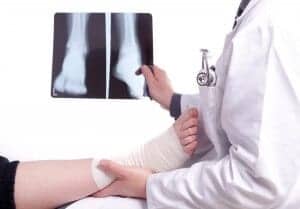
Stress Fractures: Symptoms, Treatments
Nearly 25% are metatarsal stress fractures. Causing discomfort on the tops of feet below the toes, these stressed areas can severely worsen and cause further issues if left untreated. At the Beaver Valley Foot Clinic, we have everything needed to help you accurately identify and properly treat these fractures.
Possible Causes of Stress Fractures
Stress fractures are most commonly caused when exercise is increased too rapidly. When muscles are overly fatigued and are not able to absorb enough exercise-induced shock, the excess stress is transferred to the bone. This results in the development of thin cracks within bones, as they are not able to handle such pressures. Those with osteoporosis and rheumatoid arthritis are especially at risk for these micro fractures, but it is important for everyone to take precaution when it comes to increasing your exercise routines.

Symptoms of Stress Fractures
Cracked bones in the foot cause severe pain, tenderness and swelling. Although exercises such as running may sometimes help to relieve some of the pain, afterward the pain and swelling will be even more intense. Bruising and pin-point tenderness can also accompany increased swelling. If one or both of your feet have bruised and swelled to the point of discomforting pain, contact our trained professionals at Beaver Valley Foot Clinic as soon as possible.
Stress Fracture Treatments
Treatment can include a wide range of solutions. Of course sufficient rest and a break or decrease from pain-inducing exercises should be taken, but exercises such as swimming can help reduce pain without compromising on fitness. Never continue any exercise that yields damaging pain. Also, wearing supportive hard-sole shoes, rather than flats or heels, will help give your feet support where it is needed most. Your doctor may also set up a cast form if extra support is needed for the stress fracture to heal properly. Though it can take months of wear, such casts should not be taken off too early or else the stress fracture may not completely heal. The highest risk of stress fractures, are previous stress fractures.
What Are Risk Factors Of Stress Fractures?
Stress fracture are common but there are some factors that can make it more likely to happen to you, here are some of the risk factors:
- Moving To Intense Activities Suddenly
Exercises are great and good for health but not if you over do them, if you do too much exercises then you can develop risk factors.
This can happen especially if you lived a sedentary life and suddenly moved to an active one. Your bones aren’t used to this much pressure therefore you developed a stress fracture.
This can happen even if you increase the duration of your activities.
- Suffering From Stress Fractures In Past
If you have suffered from stress fractures in past then the older fractures get hurt again or the area around it may develop some fractures.
- Some Type Of Sports
High impact sports can be a leading cause of stress fractures, that’s the reason many athletes develop bone and muscle injuries.
If you play sports like football, soccer, basketball or tennis then there are a lot of chances of you developing stress fractures.
But this doesn’t mean you should stop playing those sports, a little rest and stretching before playing is enough to protect yourself.
Are Stress Fractures Preventable
Yes, there are some easy and small tips that can help you prevent stress fractures:
- Wear Comfortable Shoes
Proper shoes are really important to prevent injuries, make sure you wear comfortable shoes when playing or working.
If you are athlete then you should ask your trainer about it.
- Start New Exercises Slowly
Do not over do them from the first day, they are new to your body to take your time and don’t do them for too long.
- Get Treatment Before Your condition Get Serious
If you notice any of the symptoms of stress fracture then try to get treatment as soon as possible.
At the Beaver Valley Foot Clinic, we have everything necessary to help you accurately identify and properly treat metatarsal fractures. The goal of our treatment plans is to help you return to everything you enjoy, as well as prevent problems later. Call us now for more information on the causes, symptoms and treatments for stress fractures, or to schedule an appointment today!
